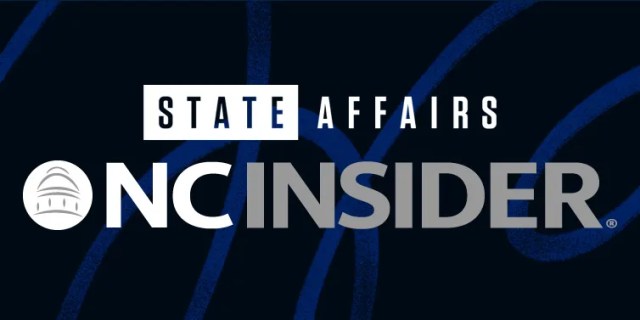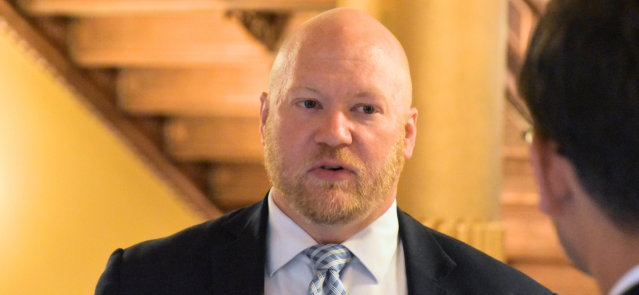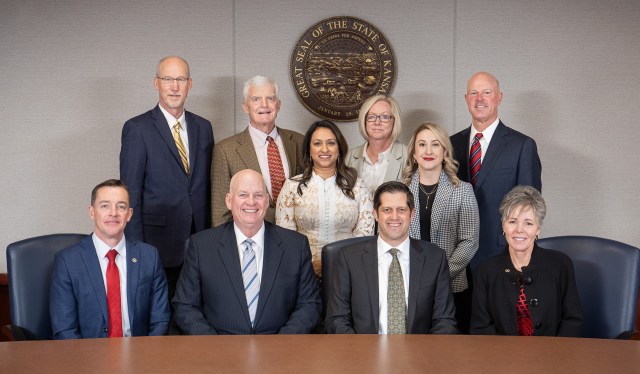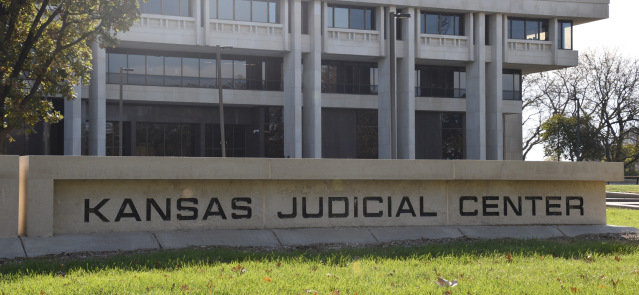YOU DON’T SAY
“I really love working on very complicated policy, breaking things down in simple-to-understand terms, and then seeing if you can get legislative victories.”
Rep. Jason Saine, R-Lincoln, on his lobbying plans after leaving the legislature. (WUNC Radio, 7/24/24)
Abortion Rulings
Gary D. Robertson and Makiya Seminera, The Associated Press, 7/27/24
A federal judge ruled Friday that a provision in North Carolina’s abortion laws requiring doctors to document the location of a pregnancy before prescribing abortion pills should be blocked permanently, affirming that it was too vague to be enforced reasonably.
The implementation of that requirement was already halted last year by U.S. District Judge Catherine Eagles until a lawsuit challenging portions of the abortion law enacted by the Republican-dominated General Assembly in 2023 was litigated further. Eagles now says a permanent injunction would be issued at some point. But Eagles on Friday restored enforcement of another provision that she had previously blocked that required abortions after 12 weeks of pregnancy to be performed in hospitals. In light of the 2022 U.S. Supreme Court decision that overturned Roe v. Wade, she wrote, the lawmakers “need only offer rational speculation for its legislative decisions regulating abortion.”
In this case, legislators contended the hospital requirement would protect maternal health by reducing risks to some women who could experience major complications after 12 weeks, Eagles said. Planned Parenthood South Atlantic and a physician who initially sued offered “credible and largely uncontroverted medical and scientific evidence” that the hospital requirement “will unnecessarily make such abortions more dangerous for many women and more expensive,” Eagles added. But “the plaintiffs have not negated every conceivable basis the General Assembly may have had for enacting the hospitalization requirement,” Eagles, who was nominated to the bench by President Barack Obama, wrote in vacating a preliminary injunction on the hospital requirement.
Unlike challenges in other states like South Carolina and Florida that sought to fully strike down abortion laws, Eagles’ decisions still mean most of North Carolina’s abortion laws updated since the end of Roe v. Wade are in place. GOP state lawmakers overrode Democratic Gov. Roy Cooper’s veto and enacted the law in May 2023. It narrowed abortion access significantly from the previous state ban on most abortions from after 20 weeks to now after 12 weeks. The hospital requirement would apply to exceptions to the ban after 12 weeks, such as in cases of rape or incest or “life-limiting” fetal anomalies.
Eagles on Friday affirmed blocking the clause in the abortion law requiring physicians to document the “intrauterine location of a pregnancy” before distributing medication for abortion.
Lawyers representing House Speaker Tim Moore and Senate leader Phil Berger defending the law argued the documentation protected the health of women with ectopic pregnancies, which can be dangerous and when ruptured may be similar to the expected symptoms of a medication abortion, according to the opinion.
But Eagles wrote the medication in a medication abortion doesn’t exacerbate the risks of complications from an ectopic pregnancy. She remained convinced that the law is unconstitutionally vague and subjects abortion providers to claims that they broke the law — and possible penalties — if they can’t locate an embryo through an ultrasound because the pregnancy is so new. The provision “violates the plaintiffs’ constitutional due process rights,” she wrote.
Spokespeople for Planned Parenthood, Berger and Moore didn’t respond to emails late Friday seeking comment. Eagles’ upcoming final judgement can be appealed.
State Attorney General Josh Stein, a Democrat, abortion-rights supporter and 2024 candidate for governor, was officially a lawsuit defendant. But lawyers from his office had asked Eagles to block the two provisions, largely agreeing with Planned Parenthood’s arguments.
The lawsuit was initially filed in June 2023 and contained other challenges to the abortion law that the legislature quickly addressed with new legislation. Eagles issued a preliminary injunction last September blocking the two provisions still at issue on Friday. Eagles said last month she would make a final decision in the case without going through a full trial.
North Carolina still remains a destination for many out-of-state women seeking abortions, as most states in the U.S. South have implemented laws banning abortion after six weeks of pregnancy — before many women know they are pregnant — or near-total bans. [Source]
Ballot Lawsuit
Will Doran, WRAL News, 7/28/24
The North Carolina Democratic Party is suing the state’s top elections officials, hoping to overturn their recent decision to allow Robert F. Kennedy Jr. on the ballot in this year’s presidential race.
The North Carolina State Board of Elections voted 4-1 last week to let Kennedy on the ballot. Notably, the board’s chairman Alan Hirsh — a Democrat appointed by Gov. Roy Cooper — publicly encouraged people who opposed that decision to sue the board. He said he personally believed Kennedy’s We The People Party had engaged in “subterfuge” in its efforts to get on the ballot, but that the elections board was nevertheless legally bound to certify the party and allow him on the ballot.
“I am going to reluctantly vote to recognize We The People, even though I believe there has been subterfuge,” Hirsch said at the time, adding that: “If someone wants to challenge that in court, they are welcome to do so. I think they have a good case.”
That’s exactly what the Democratic Party has now done, claiming that the party is a flimsy cover for Kennedy to personally be on the ballot.
The lawsuit says allowing We The People to go forward in North Carolina will set a bad precedent, since state law requires a higher bar for individual candidates to get on the ballot than it does for political parties — and also allows parties to raise unlimited amounts of money from donors, unlike individual candidates who are strictly limited in how much they can take. It warns of other politicians taking advantage of such a loophole in the future.
“If the Board’s decision is not reversed, the Board’s approach will empower any candidate for office in North Carolina to circumvent not only the requirements for access to the North Carolina ballot, but also most limits on campaign contributions and expenditures, by posing as a political party.”
Kennedy’s campaign didn’t immediately respond to a request for comment. Neither did a spokesman for the state elections board.
Republicans, meanwhile, have pushed hard to allow not just Kennedy but also far-left academic Cornel West on the ballot, through his Justice For All Party. At the same meeting the elections board voted 4-1 to allow Kennedy’s party, it voted 3-2 to deny West’s party. That vote came purely along party lines, with the board’s Democratic members all voting against West and the Republican members voting to put him on the ballot. A trio of Fayetteville voters have since filed their own lawsuit against the State Board of Elections challenging its denial of West.
The lawyers behind that lawsuit are a conservative legal team that frequently represents Republican politicians in election-related cases. And on Friday the Republican speaker of the state House, Rep. Tim Moore, filed an amicus brief backing West’s candidacy.
“Following an organized campaign by out-of-state political operatives, the North Carolina Democratic Party and a partisan front group specifically formed to ‘coordinate attacks on third-party candidates,’ the North Carolina State Board of Elections refused to certify the Justice For All Party of North Carolina as a new political party,” Moore wrote. “In doing so, [the elections board] excluded the Justice For All Party’s candidates, including presidential nominee Dr. Cornel West, from North Carolina’s 2024 general election ballot. And they deprived plaintiffs of their right to cast ballots for him this November.” [Source]
Campaign Funds
Elyse Apel, The Center Square, 7/26/24
The North Carolina Republican Party is remaining open to joining the legal effort against Vice President Kamala Harris and her presidential campaign. Since Harris jumped in to fill President Joe Biden’s vacancy, her campaign has received $96 million transferred directly from his campaign. A number of Republican groups came together to file a complaint with the Federal Election Commission.
“We are supportive of the efforts led by David Bossie and others in this matter,” said Matt Mercer, director of communications for the North Carolina GOP. “Throughout the 2024 election cycle, Democrats in North Carolina have repeatedly ignored the wishes of voters and the removal of Joe Biden as their nominee is just the latest example.”
Citizens United, a conservative interest group, says the FEC must immediately review the Harris’ campaign’s “brazen misappropriation of campaign funds.”
Citizens United was joined by 17 GOP state and territorial parties.
Mercer said the NCGOP is concerned state-level issues, while monitoring the legislation against Harris. “Currently, we are focused on numerous pending litigation efforts,” he added, “but we aren’t ruling it out should circumstances merit our involvement.” [Source]
Davis Endorsement
Danielle Battaglia, McClatchy, 7/26/24
A North Carolina Democrat joined House Republicans in a symbolic vote Thursday morning that targets Democratic Vice President Kamala Harris as she launches her presidential campaign. The House voted 220 to 196 in favor of a resolution condemning Harris as a failed “border czar” for her work on immigration policy.
Rep. Don Davis of Snow Hill was among six Democrats who sided with Republicans Thursday. “After making three trips to the southern border, I’ve seen firsthand the importance of comprehensive immigration reform, including securing the border,” Davis said in a written statement to McClatchy. “As the Administration transitions, it’s essential to continue listening and stepping up efforts to address these significant concerns. Likewise, Congress must put politics aside and work together in a bipartisan manner to accomplish this.”
Just one day later, though, Davis issued a statement endorsing Harris for president. “The stakes of this presidential election are incredibly high, with far-reaching implications,” he said in a statement announcing the endorsement. “At the same time, the administration and Congress must address the concerns of the southern border,” said Davis, repeating his call for immigration reform. “These issues cannot be overlooked.”
Davis said Friday that Gov. Roy Cooper would be “an excellent choice for vice president,” noting that the governor is a native of Eastern North Carolina. [Source]
Saine Resignation
Colin Campbell, WUNC Radio, 7/24/24
While there’s a lot of focus on President Joe Biden’s decision to drop out of the presidential race, the biggest surprise this month in North Carolina politics has been N.C. Rep. Jason Saine’s decision to resign.
Saine is one of the top Republicans in the House, chairing budget committees and leading the recent legislation to legalize sports betting. Unlike the president, Saine is relatively young and wasn’t in any danger of losing his re-election campaign — he was one of the few state lawmakers with no opponent in either the primary election or in November.
But after 13 years in the legislature, the lawmaker from Lincoln County is stepping down in August. GOP leaders in his district announced last week they’ve selected Lincoln County school board chair Heather Rhyne to replace him.
He spoke with WUNC’s Colin Campbell about the move and some of the big issues he’s worked on in the General Assembly, as well as the challenges facing legislators who try to juggle the role with other jobs.
This conversation has been edited for clarity and brevity.
You filed for another term in the House and didn’t have any sort of challenger. What made you change your mind?
“I had a conversation with former House Speaker Harold Brubaker (now a lobbyist) six or seven years ago, just picking his brain about our legislature. I asked him, ‘How did you know (when to step down)?’ He said you just kind of wake up one morning and you feel complete, and you just kind of know that it’s time to move on to something else. And that’s a lot of what happened to me.
“I need to find something that will allow me to have more time at home. There’s opportunities on the horizon, and we’re looking at what those may be. I won’t make the final decision until I’m officially out of office.”
One of the challenges with the legislature has always been the low salary. You make about $14,000 a year, the schedule is sort of erratic and you spend a lot of time in Raleigh. Did that play a role in your thought process?
“It certainly plays into it. The scheduling is a lot of back and forth. I live three hours away; our home is in Lincolnton. I can’t just go home in the evenings and live a regular life. I have made the trek many times for a band concert or basketball game. You don’t get paid for that. It comes out of your pocket, so there’s $60 gas going and $60 gas going back. It puts a lot of financial stress on legislators.
“So far, we haven’t been successful in changing that. But it does play a lot into the thought process of legislators because you really are sacrificing a lot to be serving. We limit the pool of qualified applicants simply because we’re not paying enough for people to even cover the cost.”
What’s next for you career-wise? Do you have something lined up yet?
“I have fielded some offers and am talking to different lobbying firms. I’m also talking with a mental health company based out of Maryland that a friend of mine is the owner of. He talked to me some time ago about helping them with national marketing. We’re close to finalizing an agreement there, but it would still allow me time to do things like lobbying, which would keep me involved in the policy process. I really love working on very complicated policy, breaking things down in simple-to-understand terms, and then seeing if you can get legislative victories.”
Looking back on your decade-plus in the House, what do you see as some of your biggest accomplishments from your time serving the legislature?
“Sports betting — that was a huge one. I came to sports betting, not because I was betting on sports, but I came in from a place of working on fantasy leagues. When the Supreme Court decision came that allowed sports betting to be legal nationwide, it was a natural fit for me to be the leader on that.
“Child advocacy centers — they weren’t getting the funding that they need to operate, and I was able to help. We went from an annual appropriation of just a million dollars, and I think we’re now at an annual appropriation of $12 million that goes to child advocacy centers across the state. They work with our Health and Human Services Department and get great results for kids who need it most, who have been abused, who have suffered through things that are just unimaginable.
“Esports — it was inspired by our son who hustled me and my wife to take him to New York City for the Fortnite World Championship. After we got there, I realized, wow, this is way bigger than I ever imagined, and I can understand the money that was coming in from these tournaments, and Fortnite is from a software company in Cary. Why are we doing this in New York City? We should be doing this in North Carolina. So, we started working on it, crafting legislation that supports tournaments and big events, and we built an esports league with the help of UNC Greensboro.” [Source]
Convention Representation
Paul Specht, WRAL News, 7/25/24
When Jarrod Lowery was a kid, he never could have imagined someone from the Robeson County community of Prospect — a town with fewer than 1,000 people — speaking at the Republican National Convention.
Robeson was a Democratic stronghold. Lowery’s grandmother, Louellen, was the only Republican he knew who was politically-active. Family friends “used to pick and say she was the only Republican in western Robeson County,” Lowery says. And yet there Lowery was in Milwaukee on July 15, leading the nation’s Republican delegates in the Pledge of Allegiance on national television.
“Here I am, a Lumbee boy from Prospect, in front of 20,000 people and millions of people watching, doing something on the biggest stage that Republicans have every four years,” he said.
Lowery, 35, is in his first term as a member of the North Carolina House of Representatives. He’s still learning the ropes of state government and building relationships in Raleigh. But Lowery’s presence at the state Capitol represents a years-long effort by the GOP to court supporters from the Lumbee Tribe, and his role at the convention signifies Lowery’s growing importance to the state party.
The Lumbee — who are spread across Robeson, Hoke, Cumberland, and Scotland Counties — are the largest Native American tribe recognized by the federal government that doesn’t get any of the benefits or independence granted to every other recognized tribe. The tribe has about 55,000 members, enough to influence elections in a state with a history of close contests.
Unaffiliated voters are the biggest bloc of voters in North Carolina, followed by Democrats, who have a slight edge over Republicans. In 2020, President Joe Biden lost North Carolina to former President Donald Trump by just under 75,000 votes.
In 2020, former President Donald Trump held a rally in Lumberton 10 days before the election. In 2021, a recruiter for the North Carolina House Republicans called Lowery and asked him to run for state House the following year.
Lowery is a self-employed public relations consultant. He served six years in the Marine Corps and attended UNC-Pembroke. He then worked for former Gov. Pat McCrory and Insurance Commissioner Mike Causey, becoming a regional director of constituent services for both. He was also a member of the Lumbee Tribal Council and led his brother’s campaign in 2021 to become chairman of the Lumbee Tribe.
Lowery had run for state House in 2018 but lost to a popular incumbent. In 2022, the seat was open — and Republicans were giving Robeson County more attention. That January, the Republican National Committee opened an office on Main Street in Pembroke. Lowery won his race with 60% of the vote.
The RNC is now led by Michael Whatley, former chairman of the North Carolina Republican Party. A few months prior to the convention in Milwaukee, Lowery sent a text message to Whatley offering to help. “If there’s any way I can assist or help you with the convention, I’m at your service,” Lowery told him.
“Rep. Lowery is a leader in the Lumbee Tribe and the North Carolina Legislature,” Whatley told WRAL in a statement. “It was an honor to have him join us in Milwaukee for our historic convention and I look forward to working with him closely to deliver North Carolina for President Trump in November.”
Lowery said he feels a unique responsibility to raise awareness not only for the Lumbee Tribe but for American Indians throughout the state. North Carolina is one of 14 states that is home to more than 100,000 American Indians. The Tar Heel State has more American Indians than North Dakota and South Dakota combined, according to data from the U.S. Census Bureau.
“I’m the only American Indian in the General Assembly,” Lowery said. “I am one of the few Republican American Indians in any legislature across the country. And so, I want to do whatever I can to move or to continue to make Indian Country issues priorities to the Republican Party.”
Lowery’s Democratic predecessor, former N.C. Rep. Charles Graham, is also Lumbee. He ran for Congress in 2022 and lost. Democrats hope Eshonda Hooper can defeat Lowery in the upcoming election and the party can win back support in the region, said House Minority Leader Robert Reives, D-Chatham.
“It is incumbent on Democrats to go to every community across the state and give voters a compelling, affirmative argument for why voters should cast their ballot for us,” Reives said. “I am proud that we have candidates running in nearly every district who can bring that message directly to their friends and neighbors.”
Contacted about Lowery, Hooper said in an email that “Robeson County is already experiencing a lot of division and hate in our community,” so she did not want to offer any comment that would “cause more division.” She said it’s important to note, though, that Lowery isn’t the only elected official who has sought to raise awareness of the Lumbee and fight for federal recognition. [Source]
Community College Presidents
Emily Thomas, Education NC, 7/25/24
After months of discussion and proposed changes, the State Board of Community Colleges (SBCC) approved an amendment to SBCC code regarding the local college presidential reelection process during the Board’s July meeting. With a 13 to 6 vote, the amendment will become effective Aug. 1, 2024.
Historically, local boards of trustees were granted authority to reelect local college presidents. In the 2023 budget passed last September, the General Assembly added reelection authority to the State Board of Community Colleges.
Since January, the Board has discussed the presidential reelection process and proposed amendments to SBCC code to reflect the statute passed in September 2023. During their April meeting, the Board proposed an amendment to be voted on in May. At the May meeting, Board members added two clarifications to the amendment language:
- “The SBCC shall not approve the reelection of a college president unless it has received a request to approve such college president’s reelection from the applicable local board of trustees, in compliance with this Section.”
- “In consideration of the approval of the reelection of a college president, it shall be the intent of the SBCC to ensure that such decision is properly supported by the materials submitted to the SBCC. It shall not be the intent of the SBCC to substitute its judgment for that of the local board of trustees in such local board of trustees’ reelection of its college president.”
These changes required a 60-day period for public comment after which the Board would consider the public comments before voting in July.
During the July policy and governance committee meeting, the Board approved the amendment drafted in May. [Source]
Mission Health
Andrew R. Jones, Asheville Watchdog, 7/27/24
A broad coalition of western North Carolina doctors, patient advocates, clergy members, a state senator and others are calling on HCA Healthcare to give up the Mission Health network, decrying the level of care it has provided since its $1.5 billion purchase in 2019.
The five years since the acquisition of the then-nonprofit hospital system by HCA, the nation’s largest health care corporation, have been defined by “a marked divestment in staff, resources, and services,” the group contends. It describes the exit of hundreds of doctors and nurses and the closure or departure of medical practices throughout the region, according to documents obtained Monday by Asheville Watchdog that outline the group’s intentions.
The coalition, Reclaim Healthcare WNC, also describes “a culture of disrespect, intimidation and widespread fear of retribution,” on the part of HCA.
The coalition’s stated goals are:
- Replacing HCA with a nonprofit owner committed to meet the health care needs of western North Carolina residents
- Holding HCA accountable for its harmful practices
- Restoring best-in-class care throughout the system
“We do not want the quality of our health care to be publicly traded,” one of the documents states. “We do want a restoration of the trust and pride Mission once held in our community and Region.”
The Watchdog reached out to HCA and Mission Health for response to the group’s mission.
“You should have what you need from us as we have provided you with information and responses the numerous other times you have reported on opinions from members of this group,” spokesperson Nancy Lindell said.
The coalition emphasized that the burden of HCA’s failures doesn’t rest on the backs of nurses and doctors, according to one of the documents.
“We have the deepest respect and gratitude for all the staff working at Mission,” the document stated. “The litany of problems are not on them. There remain pockets of excellence thanks to the dedication of those working within the system.”
The group’s plans are short on specifics, but it intends to achieve its goals by adding members, holding HCA accountable through state and local regulatory agencies, searching for innovative solutions and publicizing issues in the press.
The group’s leading members include Sen. Julie Mayfield, D-Buncombe; Bruce Kelly; Robert Kline, a former Mission board member before its sale; former Mission emergency department doctor Allen Lalor; Mike Messino, founder of Messino Cancer Centers; registered nurse Karen Sanders; Brevard Mayor Maureen Copelof; and Miriam Schwarz. [Source]
Toll Scam
Richard Stradling, The News & Observer, 7/26/24
One of the latest scams designed to part you from your money involves your phone and outstanding tolls you supposedly owe the N.C. Turnpike Authority.
The authority, which operates toll roads in the Triangle and Charlotte areas, learned last week that people are receiving text messages telling them they owe toll money. The messages provide a link to a website where people are told they must pay their debt or face additional charges or fees. Both the texts and the websites are bogus, the Turnpike Authority says. The agency says it never requests toll payments via text. And it wants to remind people that the website for the N.C. Quick Pass program, through which people can pay their tolls, is www.ncquickpass.com/.
The toll road text scam is popping up around the country. The Federal Bureau of Investigation put out an alert about it in April. The FBI calls the scheme “smishing,” combining “SMS” or short message service, with “phishing.”
The goal of smishing attacks is to trick people into downloading malware, sharing sensitive information or sending money to cybercriminals, the agency says. It’s not clear how the criminals choose their targets. In North Carolina, the phone numbers appear to be random, with messages going to people regardless of whether they have an N.C. Quick Pass or have driven on a toll road. [Source]
Asian American Voters
Paul Garber, WFDD Radio, 7/28/24
According to an AAPI outreach group, Vice President Kamala Harris’ emergence as the likely Democratic presidential nominee has energized the Asian-American voting bloc in North Carolina.
Harris’ mother, Shyamala Gopalan Harris, was a native of India.
For Asian-American voters, the vice president’s candidacy gives them a chance to see someone who looks like them on the ballot, says Jimmy Patel-Nguyen with North Carolina Asian Americans Together. “They’re really hoping that her lived experience as an Asian-American and Black woman will bring a lot of that representation to the highest level of government,” he says. “And what that might mean for policy making and the issues that affect the community.”
He says those issues include cost of living concerns, reproductive rights and access to affordable health care.
Asian Americans make up about 4% of the state’s population, and the number is growing rapidly. Patel-Nguyen says high turnout among them will be enough to make a difference in tight races. In 2020, former President Donald Trump won North Carolina by fewer than 100,000 votes. [Source]
I-95 Delay
David Kennard, The Robesonian, 7/22/24
A spokesman for the North Carolina Department of Transportation told the Robesonian on Monday that construction on Interstate 95 has been delayed for about a year.
The original plan was to have construction done by May 2026, but significant issues with relocating local utility lines and railroad overpass upgrades have pushed the Lumberton section project back at least one year.
“All of this work has been challenging,” said Andrew Barksdale, spokesman for NCDOT. “As a result, the project has fallen approximately one year behind schedule from when construction started in late 2021. “The current estimated completion date for widening and modernizing I-95 from [mile markers] 13-21 is now late 2027,” Barksdale said. Barksdale pointed to a “number of issues” that have slowed the major upgrade and widening project. [Source]
Drought Conditions
Port City Daily, 7/26/24
With multiple counties marked anywhere from abnormally dry to being in a severe drought by the North Carolina Drought Management Advisory Council, recent rains have alleviated the conditions.
DMAC classified five counties in severe drought, 30 counties in moderate drought and 47 counties as abnormally dry this month. Roughly 20% of the state was in a drought last week, but now it’s just more than 3% as the state has experienced 2 to 3 inches of rainfall last week.
“Widespread, heavy rainfall has resulted in a one-category improvement across most of the state,” Klaus Albertin, chair of the DMAC, said in a release. “While the deficits from June and early July have not been completely erased, conditions have improved significantly. The rains from last week should result in continued improvement.” [Source]
Unemployment Claims
USA Today Network, 7/27/24
Initial filings for unemployment benefits in North Carolina dropped last week compared with the week prior, the U.S. Department of Labor said Thursday. New jobless claims, a proxy for layoffs, fell to 3,188 in the week ending July 20, down from 3,633 the week before, the Labor Department said. U.S. unemployment claims dropped to 235,000 last week, down 10,000 claims from 245,000 the week prior on a seasonally adjusted basis.
Texas saw the largest percentage increase in weekly claims, with claims jumping by 24.9%. Kansas, meanwhile, saw the largest percentage drop in new claims, with claims dropping by 68.7%. [Source]
Pfizer Layoffs
Jack Hagel, WRAL News, 7/26/24
Pfizer Inc. plans to lay off at least 210 workers in Lee and Nash counties following a failed clinical trial for a muscular dystrophy treatment that was being developed by the global drugmaker, and as demand for other products declines. The layoffs include 150 positions in Sanford and another 60 in Rocky Mount, according to the state Department of Commerce. Pfizer filed a layoff notice with commerce officials on Wednesday. The notice was made public Friday.
The company said the sites will remain active but that it’s ceasing certain operations at 4285 N. Wesleyan Blvd. in Rocky Mount, and at 4300 Oak Park Road in Sanford, where the company has produced gene therapy treatments for muscular dystrophy and two types of hemophilia.
Some of the closures have already begun, the company said in its notice. The first workers to be affected will work through July 31, but they’ll be terminated 60 days later, Pfizer said. The terminations will be permanent.
Pfizer spokesman Steven Danehy said Friday that the cuts at the Rocky Mount facility are a result of lower projected demand and ongoing site modernization efforts. He said the site would decommission certain manufacturing lines while transitioning to new product lines. The company also said it is shifting to a contract manufacturer for a portion of its business.
WRAL previously reported that Pfizer, one of the biggest employers in Lee County, was contemplating cuts in Sanford after the trial for a Duchenne muscular dystrophy treatment failed to meet its goal of significantly improving motor function among boys 4 to 7 years old. [Source]
Diabetes Test
Chris Roush, Business NC, 7/27/24
A High Point-based biotechnology company saw its stock fall by more than 35% in after-hours trading on Friday after it disclosed that the U.S. Food and Drug Administration had halted a test of its diabetes drug. VTV Therapeutics said in a Form 8-K filing filed after the market closed on Friday that the FDA had stopped its phase three trial for its drug to treat type 1 diabetes because a “chromatographic signal” could not be resolved.
The agency requires a single in vitro study to characterize this signal before the program can resume. No patient had been dosed at the time of the clinical hold, and past clinical studies did not reveal any clinically concerning safety issues.
The drug that VTV is analyzing, Cadisegliatin, is an oral, liver-selective, glucokinase activator that the company says has been well-tolerated in more then 500 subjects to date. Their treatment has lasted up to six months.
“Patient safety is our top priority, and we appreciate the thoroughness of the FDA to better understand this signal,” said CEO Paul Sekhri in a statement. “We are working diligently with the Agency to resolve the clinical hold and resume enrollment as quickly as possible.”
VTV Therapeutics shares fell $7.61 to $13.59 in after-hours trading on Friday. Its 52-week high is $31.20. [Source]
Juneteenth Investigation
Anna Roman, The News & Observer, 7/26/24
The Raleigh Police Department is investigating a purported social-media screenshot that shows a Raleigh police officer calling Juneteenth a “made up holiday.”
“The Raleigh Police Department is aware of the post and is investigating,” according to department spokesperson Lt. Jason Borneo. “The post does not reflect our values as a city.”
The screenshot reportedly is from an Instagram story, or temporary post, by Police Senior Officer Daniel Twiddy.
“Juneteenth is a made up holiday,” according to the caption on a photo of Twiddy drinking a beverage at a Hilton Head Island resort. “Today is my birthday and it’s been that way for 38 years. Youre welcome for the day off.”
In 2021, Juneteenth was made a federal holiday to commemorate the ending of slavery in the United States. It is also a city of Raleigh holiday.
Raleigh Police Chief Estella Patterson released a statement about the post Thursday night. “The Raleigh Police Department is committed to instilling and building trust with the community we serve,” she said. “We expect our employees to hold themselves to the highest standard of excellence that reflects favorably upon the organization, both on and off duty.”
“The Police Department “celebrates the Juneteenth holiday and what it stands for,” Patterson said, adding she appreciated the many social-media users who brought the social media post to their attention.
Twiddy, who was hired by the Police Department in 2009, is on administrative leave “while this matter is being investigated.” [Source]
Attorney Property
Joe Marusak, The Charlotte Observer, 7/28/24
The lawyer for George W. Bush in the disputed Florida ballot recount during the 2000 presidential election is selling his longtime North Carolina mountain retreat for $15 million.
William Scherer Jr. led Bush’s team of attorneys during litigation over the Florida recount and “personally represented” Bush in the Broward County recount, according to his bio on the website of his Fort Lauderdale law firm, Conrad & Scherer. The U.S. Supreme Court ultimately intervened in the dispute that involved a part of punch-card ballots known as “hanging chads.” The court ruled 7-2 to end a Florida court’s ordered recount, prompting Democratic presidential nominee Al Gore to concede the election to Bush.
Scherer and his wife, Anne’s 149-acre North Carolina mountain estate includes creeks, a waterfall and 40 acres of grasslands and pasture. Their Ridges of Steel Creek estate is perched 3,600 feet high, 11 miles from Brevard. [Source]
NC Insider Legislative Report
LB: LEGISLATIVE BUILDING. LOB: LEGISLATIVE OFFICE BUILDING
HOUSE CALENDAR
Monday, July 29, 2024
House Convenes at 12:00 P.M.
- Reconsideration of Vetoed Bills
SENATE CALENDAR
Monday, July 29, 2024
- Senate Convenes at 12:00 P.M.
HOUSE & SENATE: Reconvening allowed under provisions of SB 916, if no sine die adjournment previously adopted.
- Monday, Sept. 9 to Wednesday, Sept. 11
- Wednesday, Oct. 9
- Tuesday, Nov. 19 to Friday Nov. 22
- Wednesday, Dec. 11 to Friday Dec. 13
Other Legislative Studies and Meetings
LB: LEGISLATIVE BUILDING. LOB: LEGISLATIVE OFFICE BUILDING
HOUSE CALENDAR
Monday, July 29, 2024
- House Convenes at 12:00 P.M.
SENATE CALENDAR
Monday, July 29, 2024
- House Convenes at 12:00 P.M.
HOUSE & SENATE: Reconvening allowed under provisions of SB 916, if no sine die adjournment previously adopted.
- Monday, July 29 to Thursday Aug. 1
- Monday, Sept. 9 to Wednesday, Sept. 11
- Wednesday, Oct. 9
- Tuesday, Nov. 19 to Friday Nov. 22
- Wednesday, Dec. 11 to Friday Dec. 13
N.C. Government Meetings and Hearings
BOLD ITEMS ARE NEW LISTINGS
Wednesday, July 31
- 10 a.m. | North Carolina State Board of Education meets, 1 South Wilmington St, Raleigh.
Thursday, Aug. 1
- 6 p.m. | The North Carolina Department of Environmental Quality’s Division of Air Quality Public Hearing on Moriah Energy Center Draft Air Quality Permit, Vance-Granville Community College, 200 Community College Road, Henderson.
Monday, Aug. 5
- 9 a.m. | The Board Development Committee of The North Carolina Partnership for Children meets, The meeting will be held via Zoom. You may contact Yvonne Huntley at 984.221.1242 or email at [email protected] for additional information.
Tuesday, Aug. 6
- 9 a.m. | The Council of State meets. 1 South Wilmington St, Raleigh.
Monday, Aug. 19
- 2 p.m. | The Executive Committee of The North Carolina Partnership for Children meets, The meeting will be held via Zoom. You may contact Yvonne Huntley at 984.221.1242 or email at [email protected] for additional information.
UNC Board of Governors
23 S. WEST STREET, SUITE 1800, RALEIGH
Wednesday, Sept. 11
- Meeting of the Board of Governors, TBA.
Thursday, Sept. 12
- Meeting of the Board of Governors, TBA.
Thursday, Oct. 17
- Meeting of the Board of Governors, TBA.
Wednesday, Nov. 13
- Meeting of the Board of Governors, TBA.
Thursday, Nov. 14
- Meeting of the Board of Governors, TBA.
N.C. Utilities Commission Hearing Schedule
DOBBS BUILDING, 430 NORTH SALISBURY STREET, RALEIGH
Tuesday, Aug. 13
- 10 a.m. | Public Hearing – Annual Review of Gas Costs | G-5 Sub 675
Wednesday, Aug. 14
- 7 p.m. | Public Witness Hearing – Application for General Rate Increase for Piedmont Natural Gas Company, Inc. | G-9 Sub 837
Tuesday, Aug. 20
- 6 p.m. | Public Witness Hearing – Application for Transfer of Public Utility Franchise and Approval of Rates of HISCO East, LLC in Carteret County to HISCO I in Carteret County | W-1297 Sub 17, W-1344 Sub 0
- 6 p.m. | Public Witness Hearing – Application for Certificate of Public Convenience and Necessity and for Approval of Rates to Provide Sewer Utility Service to Currently Served Cape Ponte Village Subdivision, Additional Phases for the National Park Service, Harkers Island RV Park and a Fe | W-1344 Sub 1
Wednesday, Aug. 21
- 7 p.m. | Public Witness Hearing – Application for General Rate Increase for Piedmont Natural Gas Company, Inc. | G-9 Sub 837
Thursday, Aug. 22
- 7 p.m. | Public Witness Hearing – Application for General Rate Increase for Piedmont Natural Gas Company, Inc. | G-9 Sub 837
Other Meetings and Events of Interest
BOLD ITEMS ARE NEW LISTINGS
Saturday, July 27
9 a.m. | North Carolina Federation of Young Republicans Convention, The Farm at 95, Selma.







